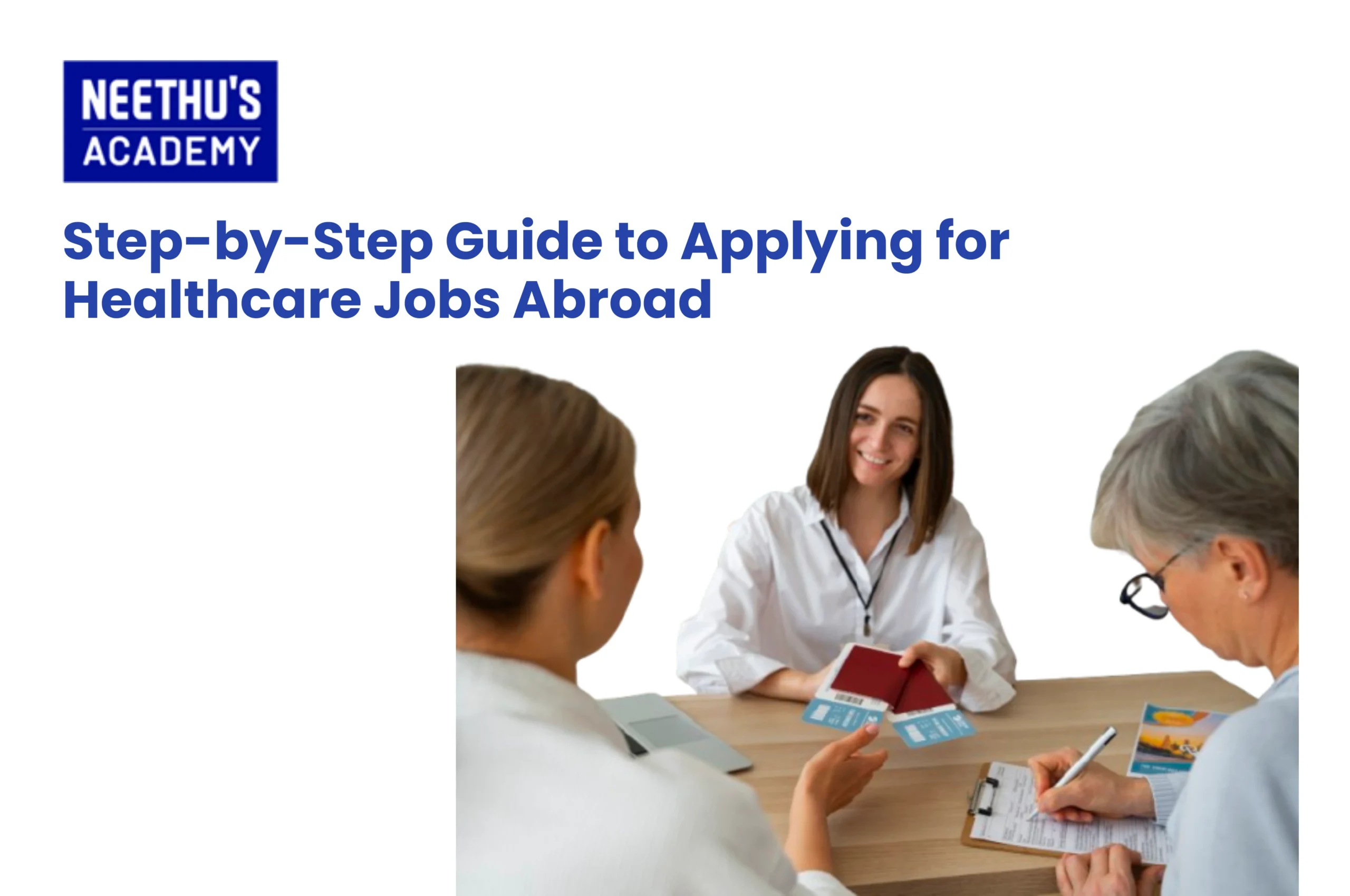
Step-by-Step Guide to Applying for Healthcare Jobs Abroad
Over the past years, the demand for healthcare professionals worldwide has been at an
all-time high. Ageing populations, shortages of personnel within healthcare organisations,
and rising medical needs have opened wide possibilities for nurses, doctors, therapists, and
other medical specialists from other countries. Whether a nurse looking to work in the UK, a
physiotherapist targeting Australia, or a doctor who wants to explore options in the Middle
East, looking for healthcare employment abroad means career growth, new cultural
exposure, better salaries, and professional enhancement.
Working abroad also provides health professionals with international experience, adding
great value to their profiles. However, understanding the process of nursing abroad and
meeting the required qualifications are key in making a smooth transition.
The Eligibility and Qualification Requirements
Before applying to work in any international healthcare job, it is vital to confirm that your
qualifications meet those countries’ minimum requirements. Most countries have strict
eligibility requirements to ensure safety for patients and maintain quality in healthcare.
1. Educational Qualification:
A nursing or medical degree/diploma from an accredited institution is required. The degree
also must be equivalent to the local qualification in the country you are applying to.
2. Professional Experience:
Many countries prefer healthcare professionals with at least one to two years of clinical
experience. Specializations like ICU, midwifery, or surgical nursing can further improve job
prospects.
3. Language Proficiency:
Proficiency in the English language-or the official language of the destination-is often
required. Tests such as OET (Occupational English Test) or IELTS are commonly accepted by
licensing authorities and employers.
4. Good Standing Certificate:
This certificate, issued by your home country’s nursing or medical council, verifies that you
are professionally competent and have no disciplinary record.
5. Health and Character Certificates:
To prove your suitability for employment abroad, you will usually need a medical fitness
certificate and a police clearance certificate.
Licensing Exams Required by Destination
The most important step in the nursing abroad process is clearing the licensing exam for
your destination country. Such exams ensure that healthcare professionals meet the local
standards of practice.
United States: For nurses, the NCLEX-RN exam is compulsory, along with English proficiency
tests like IELTS or OET.
United Kingdom: Nurses must pass the CBT (Computer-Based Test) and OSCE (Objective
Structured Clinical Examination), and demonstrate English proficiency via OET or IELTS.
Canada: Requires the NCLEX-RN and sometimes additional registration with the provincial
regulatory body.
Australia & New Zealand: Nurses need to register with AHPRA (Australia) or NCNZ (New
Zealand) and pass the OET or IELTS exam.
Middle East (UAE, Saudi Arabia, Qatar, Oman): Each has its own licensing exam such as DHA,
MOH, HAAD, or QCHP.
Research the specific exam and the process of registration for your target country in
advance.
How to Prepare Documents for Job Applications
Documentation is critical when applying for healthcare jobs abroad. Incomplete or
unverified documents can delay your application. Here’s how to prepare effectively:
1. Create a Professional Resume:
Emphasize your education, clinical experience, certifications, and key skills. Adapt your
resume to the international healthcare job market by using international resume formats.
2. Academic Certificates:
Include your degree/diploma, transcripts, and mark sheets. If required, get them attested by
the relevant authorities or verified by agencies like WES (World Education Services).
3. Prepare Professional Documents:
These include your nursing registration certificate, Good Standing Certificate, and
experience letters from previous employers.
4. Language and Licensing Documents:
Keep your OET/IELTS certificates, NCLEX, or any licensing exam results handy.
5. Passport and Visa Documents:
Your passport should be valid for at least six months beyond the date of travel you intend to
make. Also, prepare passport-sized photos and identity proofs as needed.
6. Digital Scans and File Organization:
Keep scanned copies of all your documents in PDF format and store them securely on your
device or cloud storage for easy access during online applications.
Reliable Job Portals and Recruitment Agencies
First and foremost, finding genuine job opportunities is critical to avoiding fraud and to
ensuring a hassle-free recruitment process. Several trusted job portals/recruitment agencies
are dealing in international healthcare careers:
NHS Jobs (UK): The official platform for healthcare positions in the UK.
Indeed and Glassdoor: International job portals posting health professional vacancies from
around the world.
O’Grady Peyton International (US): Specializes in nursing placements in the United States.
Alliance Recruitment Agency & Dynamic Health Staff (India-based): Reputed agencies for
nurses seeking jobs in the UK, Ireland, and the Gulf.
HealthStaff Recruitment (Australia): Focuses on placing healthcare workers in Australia and
New Zealand.
Before signing up with an agency, make sure to check their licensing status. Avoid recruiters
asking for upfront fees.
Visa and Relocation Tips
The next stage, after being offered a job, is to obtain your work visa and prepare for
relocation. Here’s what to keep in mind:
1. Application for a Work Visa:
Your employer or a recruitment agency will normally help you with the visa application
process. You usually need an offer letter, an employment contract, medical clearance, and
proof of qualifications.
2. Financial Preparation:
Save enough funds to cover travel, accommodation, and initial living expenses until your first
paycheck arrives.
3. Accommodation Planning:
Many employers offer temporary housing or relocation aid. If not, investigate safe and
reasonably priced options near your workplace.
4. Cultural Adaptation:
Understand the local culture, healthcare ethics, and communication standards. Quick
adaptation to a new environment leads to higher job satisfaction and performance.
5. Health Insurance and Tax Registration:
Your employer should also provide health insurance; you could have to register for a tax
identification number when you arrive.
6. Stay Connected:
Join social media groups or online communities of expatriate healthcare workers in your
destination country for support and advice.
Conclusion
Each step brings you closer to realizing your dream overseas, from qualifying exams to visa
paperwork, all in the quest for an international healthcare career. First, do your research on
the country’s requirements, clear your language and licensing exams, get quality
documentation ready, and apply through legitimate channels. A well-planned approach
makes sure that you transition to your new role smoothly, expand your skills, and experience
the associated rewards of contribution to global healthcare. Quantity aids in describing the
size or magnitude of something.
Frequently Asked Questions
Among these, countries like New Zealand, Australia, and the UK are considered easier
because of clear licensing pathways and strong demand for nurses.
Yes, most English-speaking countries require OET or IELTS to assess communication skills for
licensing and employment
The licensing process can take 3 to 9 months, depending on the destination country and
document verification speed.
Reputed agencies never charge candidates; they are usually paid by the hiring employer
Related Blogs
- All Posts
- canada
- CBT
- DHA
- French
- GENERAL
- German
- Haad
- IELTS
- IQN NEW ZEALAND
- MOH
- NCLEX-RN
- NHRA
- OET
- OSCE
- Pearson Vue
- PROMETRIC
- PTE
- TOEFL
- Back
- NCLEX - NGN
- Back
- OET FOR PHYSIOTHERAPIST
- OET FOR PHARMACIST
- OET FOR DOCTORS
Writing a professional and concise referral letter is a critical skill for healthcare professionals taking the OET Writing Sub-Test. This test evaluates…
Preparation for the IELTS Speaking Test is exciting and a bit stressful, especially when referring to part 2, popularly known as the…
Any healthcare professional planning on pursuing their career in an English-speaking environment, has to meet with their first hurdle, which is the…
Course Enquiry
Latest Posts
- All Posts
- canada
- CBT
- DHA
- French
- GENERAL
- German
- Haad
- IELTS
- IQN NEW ZEALAND
- MOH
- NCLEX-RN
- NHRA
- OET
- OSCE
- Pearson Vue
- PROMETRIC
- PTE
- TOEFL
- Back
- NCLEX - NGN
- Back
- OET FOR PHYSIOTHERAPIST
- OET FOR PHARMACIST
- OET FOR DOCTORS



